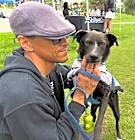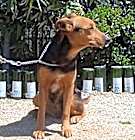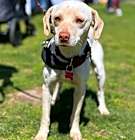Color
Tan/Yellow/Fawn - with Black
Size
(when grown) Med. 26-60 lbs (12-27 kg)
Details
Good with kids
Good with dogs
Not good with cats
Spayed or Neutered
Shots are up-to-date
Story
Maggie is a delightful young female Hound Terrier mix, born on March 23, 2022, and weighing 30 pounds. With her sweet, outgoing, and affectionate nature, Maggie is sure to capture the hearts of everyone she meets. Her adventurous spirit and love for cuddles make her an ideal companion for families who enjoy exploring new places and showering their furry friends with affection. Things to Know About Hound Terrier Mixes Hound Terriers are known for their energetic, intelligent, and curious nature. They inherit the best traits from both breeds, making them excellent companions for active families. Hounds are often recognized for their strong sense of smell and hunting instincts, while Terriers are known for their spirited and determined personalities. This combination results in a dog that thrives on adventure and mental stimulation, requiring plenty of exercise and engagement. What to Expect When Adopting a Dog Like Maggie Energetic Adventures: Maggie thrives on excitement and loves exploring. Be prepared for adventurous walks, hikes, and trips to the park that will keep her entertained and happy. Affectionate Cuddles: With her love for closeness, Maggie will happily snuggle up with you. Regular cuddle sessions and quality time together will strengthen your bond and ensure she feels cherished and secure. Training and Guidance: Although Maggie is eager to please, training will be essential to help her understand household rules and expectations. Consistent, reward-based methods will guide her toward becoming a well-behaved companion. Socialization Opportunities: Maggie's friendly nature makes her great with other dogs and people. Arranging playdates and outings will help her develop strong social skills and confidence in various settings. Balanced Routine: A balanced routine that includes both active play and relaxation will keep Maggie happy and healthy. Regular walks, interactive toys, and downtime will help manage her energy levels and provide mental stimulation. Commitment and Love: Adopting Maggie means committing to providing her with love, care, and attention. She will flourish in a home where she feels cherished and secure, with family members who are ready to give her their all. By welcoming Maggie into your home, you're inviting a sweet and adventurous companion into your life. Her playful spirit and loving nature are sure to fill your days with joy and warmth. If you're ready for an affectionate and lively furry friend, Maggie might just be the perfect match for your family! If interested please go to our website and fill out an application. You can find our application under the adoptable dogs icon. Thank you for choosing Ozzie and Friends Rescue. We can’t wait to connect you with your new fur-ever friend. https://www.ozzieandfriendsrescue.org/ Ozzie and Friends Rescue makes arrangements for all dogs adopted to be transported all across the Western United States, Canada and the Midwest. November 13, 2024, 9:03 pm







